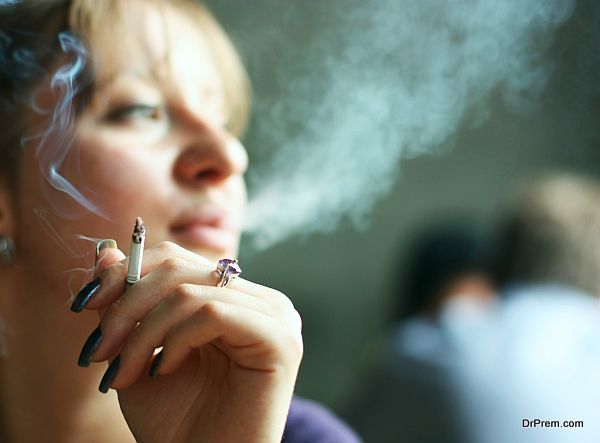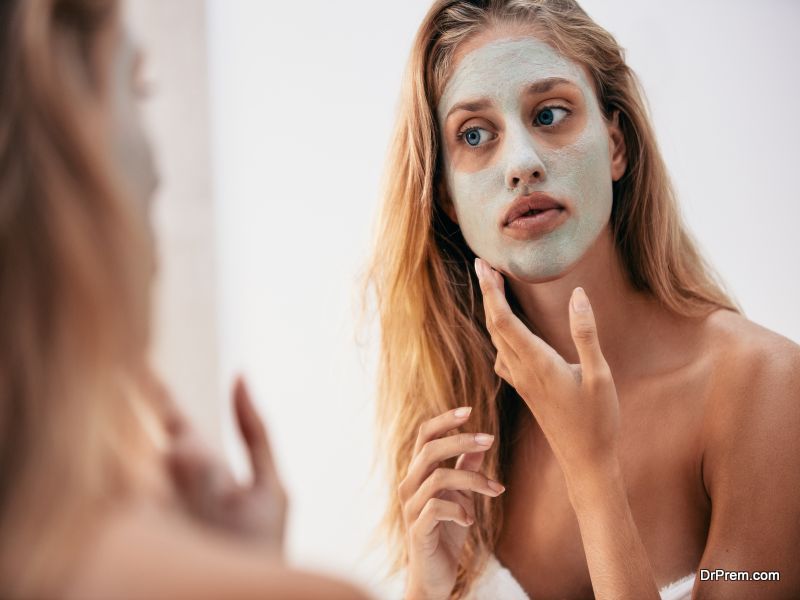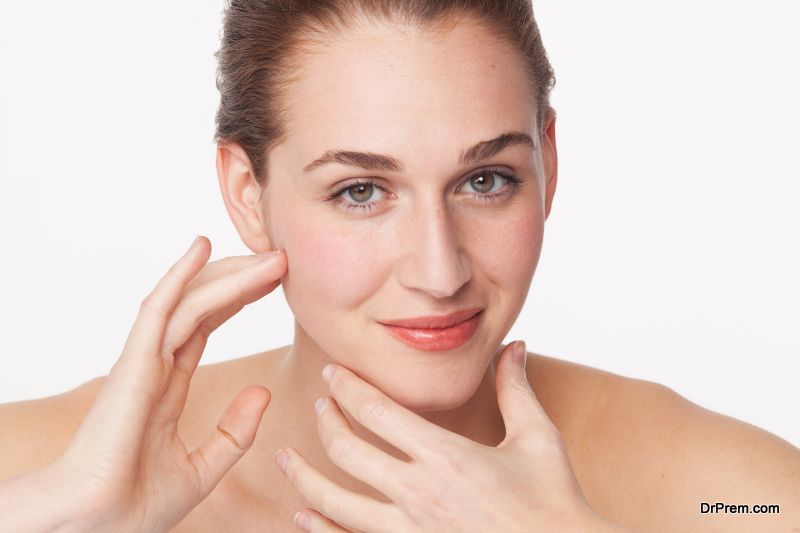When you think of major organs in the human body, what comes to mind? Most likely the heart, lungs, and maybe even kidneys. And while all of these organs are vital to your survival, did you know that the body’s largest organ is actually your skin? The average adult’s skin weights approximately 8 pounds and is responsible for keeping our body’s warm, safe, and healthy. Our skin is the first line of defense against harmful outside entities, which is why it’s so important that you treat it right. Keeping your skin strong and healthy isn’t just about protection for your internal organs and the function of your body, but glowing skin is also an extremely attractive and highly sought after characteristic for many people. But how do you achieve skin that’s not only healthy but also beautiful and smooth? Check out these tips and find out.
Reduce Stress
 You probably knew that stress can cause heart complications, tension headaches, and even high blood pressure, but did you know that it can actually affect the health of your skin? Stress causes a spike in all types of hormones and chemicals in your body and may boost your body’s production of androgens, which are responsible for the oil in your skin. While some oil is healthy for lubrication, too much of it can cause unwanted breakouts including acne and even rashes or irritation. Not only that, but stress can also weaken your immune system, leaving your body and skin more susceptible to the bacteria that causes acne. If you’re looking for ways to reduce stress, try meditation, yoga, or getting a message. A facial will do both, reduce your stress and promote healthy, glowing skin.
You probably knew that stress can cause heart complications, tension headaches, and even high blood pressure, but did you know that it can actually affect the health of your skin? Stress causes a spike in all types of hormones and chemicals in your body and may boost your body’s production of androgens, which are responsible for the oil in your skin. While some oil is healthy for lubrication, too much of it can cause unwanted breakouts including acne and even rashes or irritation. Not only that, but stress can also weaken your immune system, leaving your body and skin more susceptible to the bacteria that causes acne. If you’re looking for ways to reduce stress, try meditation, yoga, or getting a message. A facial will do both, reduce your stress and promote healthy, glowing skin.
Reduce Sun Exposure
Sun damage is one of the leading causes of wrinkles and skin-related cancers. Although your skin does receive important nutrients from the sun, primarily vitamin D, exposure should be limited. You also need to protect your skin at all times. Be sure to wear adequate sunscreen when heading outdoors. Apply sunscreen approximately 30 minutes before heading outside and reapply it every 1-2 hours. If you’re swimming or near water, be diligent about applying and reapplying to ensure your skin remains protected. Another great way to keep your skin protected is by using accessories like oversized hats, sunglasses, and swim shirts and other light colored, loose fitting clothing.
Avoid Nicotine
 It’s no surprise that smoking cigarettes is bad for you. It can cause lung cancer, COPD, emphysema, and a long list of other health complications, including a more aged appearance of your skin. Nicotine causes yellowing of both the teeth and skin. It’s also known to increase the amount of visible wrinkles on the face and make users appear older. Nicotine deprives your skin of essential nutrients and adequate oxygen. It can also reduce elasticity, which is the main cause for visible wrinkles.
It’s no surprise that smoking cigarettes is bad for you. It can cause lung cancer, COPD, emphysema, and a long list of other health complications, including a more aged appearance of your skin. Nicotine causes yellowing of both the teeth and skin. It’s also known to increase the amount of visible wrinkles on the face and make users appear older. Nicotine deprives your skin of essential nutrients and adequate oxygen. It can also reduce elasticity, which is the main cause for visible wrinkles.
Hydrate
The average human body contains over 50% water and needs proper hydration to function. Hydration is extremely important for overall health but also for the health and appearance of your skin. This is due, in part, to the fact that water helps flush toxins from the body. These toxins are sometimes responsible for the appearance of blemishes, acne, and wrinkles. Not only that, but water is responsible for carry important nutrients and oxygen to skin cells throughout the body.
Eat the Right Foods
 Not only is what you drink important for skin health, but the foods you eat can also improve the appearance of your skin. A diet rich in vitamins and minerals promotes overall health, which is reflected in your skin. Things like fresh fruits, vegetables, proteins, and whole grains are all found in a well-balanced diet. Fish and nuts help expel oils from your body and skin, reducing acne and clogged pores. A diet high in sugar and processed foods can cause inflammation and exacerbate pre-existing skin conditions including eczema, rosacea, and psoriasis.
Not only is what you drink important for skin health, but the foods you eat can also improve the appearance of your skin. A diet rich in vitamins and minerals promotes overall health, which is reflected in your skin. Things like fresh fruits, vegetables, proteins, and whole grains are all found in a well-balanced diet. Fish and nuts help expel oils from your body and skin, reducing acne and clogged pores. A diet high in sugar and processed foods can cause inflammation and exacerbate pre-existing skin conditions including eczema, rosacea, and psoriasis.
Moisturize
Think of moisturizing your skin the same way you view hydrating your body with water. When you moisturize your skin, you prevent its dehydration and supports your body’s own, natural moisture levels. Try applying moisturize after a hot shower, when the pores are open and the skin is damp. This helps your body better absorb the moisturizer along with the moisture from the shower. Both of these beneficial ingredients are trapped in your skin, leading to a smoother and healthier appearance and feel. You can even purchase a facial moisturizer that contains SPF and offers additional protection from damaging sun rays.
Exfoliate
 Exfoliating is an important part of skin health but one that most people neglect. Your skin naturally sheds its top, dead layers, making way for new, healthier skin to emerge. The exfoliation process is when your body sheds these layers naturally, or you chemically remove them. This can be done in a variety of ways including getting a facial, using face washes and scrubs designed to scrub these dead skin cells away, or treatments such as the Dermapen Treatment. Not only does exfoliation remove dead skin cells and allow healthier skin to peek through, but it also prevents clogged pores and blackheads from forming. Exfoliation, whether done at home or at a spa, should be performed at least once a week.
Exfoliating is an important part of skin health but one that most people neglect. Your skin naturally sheds its top, dead layers, making way for new, healthier skin to emerge. The exfoliation process is when your body sheds these layers naturally, or you chemically remove them. This can be done in a variety of ways including getting a facial, using face washes and scrubs designed to scrub these dead skin cells away, or treatments such as the Dermapen Treatment. Not only does exfoliation remove dead skin cells and allow healthier skin to peek through, but it also prevents clogged pores and blackheads from forming. Exfoliation, whether done at home or at a spa, should be performed at least once a week.
Go Easy on the Make-Up
Nothing clogs pores more than piling on layers of thick, damaging make-up. Make-up also suffocates your skin, preventing adequate oxygen flow. Whenever possible, properly wash your face, apply moisturizer, and leave your bare skin exposed to outside air. This is a great way to open your pores and let your skin breathe. Even if you can’t manage wearing no make-up at all, try to limit how much you use and the frequency. This will reduce irritation and improve the appearance of your skin. Not to mention, natural beauty is gorgeous!
Get Adequate Sleep
 Getting a quality night’s sleep promotes brain health, allows your body and mind to rest and recover, but may also be a key element in promoting the health of your skin. Just like other parts of your body rest and rejuvenate during sleep, so does your skin. Lack of sleep leads to exhaustion, fatigue, and stress. This takes its toll on your body and may be physically visible on your skin. They call it beauty sleep for a reason. The more rested you are, the healthier your skin appears and feels.
Getting a quality night’s sleep promotes brain health, allows your body and mind to rest and recover, but may also be a key element in promoting the health of your skin. Just like other parts of your body rest and rejuvenate during sleep, so does your skin. Lack of sleep leads to exhaustion, fatigue, and stress. This takes its toll on your body and may be physically visible on your skin. They call it beauty sleep for a reason. The more rested you are, the healthier your skin appears and feels.
Taking care of your skin is as important as nourishing any other part of your body. It can easily be done with the right foods, hydration, and proactive tactics like applying sunscreen and exfoliating. Skin care isn’t complicated but is highly beneficial.
Article Submitted By Community Writer




